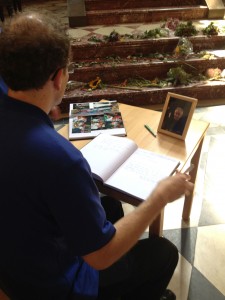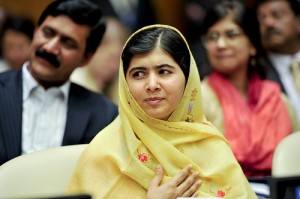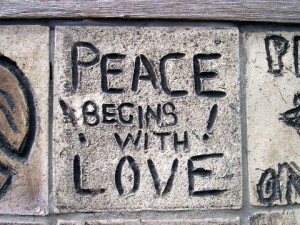Three years ago, I wrote an article entitled “Thoughts on Veterans Day.” In it, I encouraged us to seek a “peaceful way of life” and to “pray for peace around the world.” But what a difference three years makes! When I wrote those words, the ongoing civil war in Syria was just beginning; the “Arab Spring” was less than a year old; ISIS did not exist; and Sandy Hook and Benghazi were just locations, not tragedies of violence. Osama bin Laden had been killed six months earlier, and American troops were still heavily engaged in Iraq and Afghanistan. in our own nation, Michael Brown and Trayvon Martin were still alive.
God, grant us peace in our time, so that three years from now we will have fewer reasons to be surprised at the human capacity to wage war and to act violently.
Today, Veterans Day, is a day when our cultural sensitivity is at its highest: the nation pauses at 11am, the eleventh hour of the eleventh day of the eleventh month, in honor and remembrance of all those men and women who have served in the armed forces of the United States. This is an expansion of the original Armistice Day, a celebration of the end of World War I – the “war to end all wars” – which ended at 11am on November 11, 1918. In the intervening ninety-six years since that date, we have seen many more wars, many more acts of violence, many more veterans being carried home in caskets or carrying PTSD home with themselves, many more pursuits of arms rather than pursuits of armistice.
God, grant us peace in our time, so that four years from now we can celebrate the 100th anniversary of the end of World War I with thankfulness that peace is defeating violence both at home and abroad.
Today, in my daily Bible reading, I read the four gospel accounts of the burial and resurrection of Jesus. For Christians, this event is the climax of human history. Everything changes because Jesus lived, taught, ministered, died, and rose again. We interpret our lives and world events through the lens of Christian faith. Our allegiance is first and foremost to the kingdom of God, which Jesus proclaimed throughout his ministry. Our hope is in the salvation of God, which Jesus brought about through his death and resurrection. Our peace is found in reconciliation with God, which Jesus graciously provided through no help of our own. Jesus is the True Veteran, the one who waged war against sin itself and was victorious, the one who achieved this victory not through aggression and violence and bombs and guns and survival tactics but through laying down his life of his own volition, the one who served not a nation or state but a kingdom, his kingdom, an unending kingdom, a kingdom of peace.
God, grant us peace in our time, so that ten, twenty, fifty years from now we will see that “the kingdom of the world has become the kingdom of our Lord and of his Christ” (Revelation 11:15 NIV).
Yes, Lord, bring your peace into this world, and bring it quickly.
In the final words of the Bible (Revelation 22:20-21 NIV),
He who testifies to these things says, “Yes, I am coming soon.” Amen. Come, Lord Jesus. The grace of the Lord Jesus be with God’s people. Amen.






